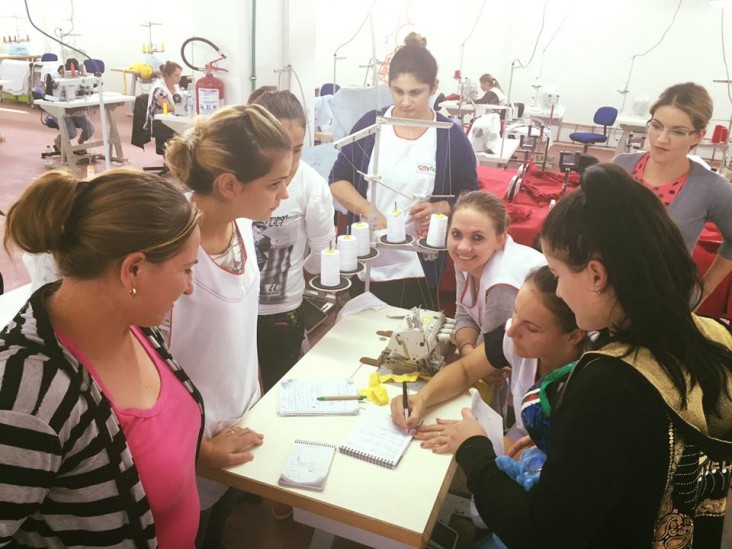Speeches Shim

February 2017—“There can’t be any more big bosses who care just for profit, power and prestige—their employees won’t work well for them.”
It was an unexpected and visionary comment from Gjergji Gjika, the very practical businessman/investor and CEO of CityTex, who has taken a new garment factory from idea to production in only nine months.
As a social business, CityTex is different from its competitors. “This is what businesses of the future will look like all over the world, and it’s better to be first than last,” added Gjika.
Like a traditional business, the company produces a product or service that meets a need in an identified market, and then sells it for a profit. As a social business, though, it not only makes a profit, but invests back into the community or works to lift a marginalized sector. Ideally, there are prospects for future growth and shared profitability.
The new factory, planted in a rural Albanian village, was abuzz as it approached the successful completion of its first large order, this one for work overalls and shirts, each item passing through a quality control scrutiny worthy of an urban couturier. It had the hallmarks of a business success.
Since January 2016, Yunus Social Business has been working with USAID in Albania, financing and mentoring four successful social businesses, with more in the pipeline. As a financier to over 400 local entrepreneurs, Yunus is active in eight countries, including Albania, helping to build business solutions to social issues. It bears the name of co-founder and Nobel Peace Prize Laureate Muhammad Yunus.
USAID’s support of CityTex is part of its Growing Social Businesses in Albania project, which is designed to promote entrepreneurship and the development of social businesses in vulnerable and underserved communities in order to generate lasting and positive social, economic and environmental impact in a financially sustainable way.
The CityTex garment factory was just an idea in January 2016, a plan by March, and, during April through June, made its first investment, registered as a new business, and trained employees. In July, the factory tested products and conducted advanced training. By August, the factory had hired 60 women from the community, all with new skills and salaries designed for the long term.
Women employees are engaged in a variety of tasks in the factory’s light, airy, high-ceilinged progression of working areas. The sanitary facilities include bright changing rooms and a designated lunch area.
The factory is located in Shtërmen-Cerrik, a poor village surviving on subsistence farming and remittances from the many villagers who have departed for work abroad. The women are typically married, often to husbands who work seasonally in neighboring Greece or Italy. Most of the women have been mired at home keeping house, farming the fields, and minding parents, children and livestock, with no external social life.
CityTex is helping to circulate people with purchasing power, bringing them to work, stores and cafés. It is also expected to create a value chain as shops sell more goods and buy more as a result.
According to Yunus Balkans Director Shkelzen Marku, the most critical and difficult aspect to finding partners in a social business is the entrepreneur. “The person who is often a good businessman or businesswoman lacks social drive, or is socially minded but lacks business expertise. The ideal is a combination, and the search for these ‘rare birds’ presents the greatest challenge to Yunus,” says Marku.
Yunus discovered one of those rare birds in Gjergji Gjika of CityTex: an entrepreneur who combines in-depth business experience with a true concern for the community and the lives of its people. He is a big man with a warm presence and the ability to laugh as he describes how the factory copes with new employees used to a farm, not a factory routine (“late today because I need my hair done for the folk music festival next week”).
As the garment-hungry European markets send orders, the CityTex team has worked out a transparent salary calculation that the employees understand and a production timeline that is expected to turn a profit even as the company works to raise workforce productivity.
Meanwhile, while wages are good at CityTex, the future holds a full cafeteria and a kindergarten. “We want to create a good business atmosphere,” says Gjika.
USAID’s Growing Social Businesses in Albania project has reached more than 1,200 people to date through events raising awareness about social business and entrepreneurship and has supported seven startup businesses that are providing services or employment for vulnerable communities in Albania. Currently, the project, which runs from January 2016 to January 2019, is conducting its second social business accelerator program specific to NGOs working for social inclusion of women, children and Roma.
LINKS

Comment
Make a general inquiry or suggest an improvement.